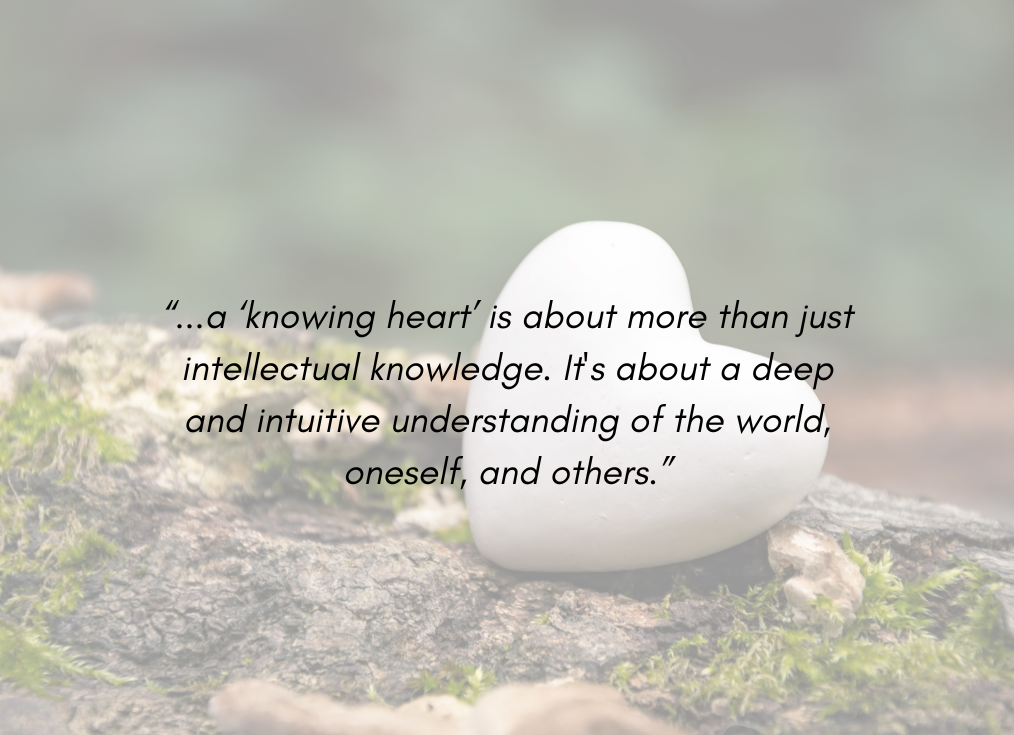A Knowing Heart

September 1, 2023 | 15 Elul 5783
In this week’s Torah portion, Ki Tavo, we read of the “knowing heart,” which the rabbis expounded upon because of the disconnect between the traditional feeling heart and the knowing mind. Our great sages made sense of the “knowing heart’s” dissonance by explaining it as the unique struggle in the covenant between the people and Gd. Not until we received the Ten Commandments did Gd finally give us a “heart to understand.” (Deuteronomy 29:3)
In previous columns, I have highlighted Judaism’s distinction between wisdom and knowledge, explaining that knowledge is knowing the information, but wisdom is knowing what to do with the knowledge. Yet it is in this week’s Torah portion where we find the source of this distinction underscoring our capacity for deeper understanding, insight, and compassion; and although there are unlimited examples of the wisdom of the knowing heart, these instances most often appear in four contexts:
- Spiritual and Religious: In many religious traditions, a “knowing heart” is associated with a person’s ability to discern spiritual truths, connect with a higher power, and understand the deeper aspects of faith. It implies a wisdom that goes beyond mere intellectual knowledge and extends into matters of the soul. This is why our synagogues and temples are so important to our Jewish community infrastructure.
- Emotional Intelligence: In psychological and self-help literature, a “knowing heart” can refer to emotional intelligence—the ability to recognize, understand, and manage one’s own emotions and the emotions of others. It implies a deep insight into human emotions and relationships. This is why volunteering and performing gemilut chasadim (“acts of love and kindness”) is a core Jewish value.
- Intuition and Gut Feeling: Sometimes, a “knowing heart” is linked to intuition or gut feelings. It suggests that a person can make wise decisions or judgments based on their instincts or inner feelings, even when they can’t explain those feelings rationally. This has been the impetus for our cultural drive to innovate throughout history. Always wanting to improve on what already exists.
- Compassion and Empathy: A “knowing heart” can also imply a strong sense of compassion and empathy for others. It suggests that someone understands the suffering, joys, and needs of those around them on a profound level. The belief in our need for Tikkun Olam (“repairing the world”), to actively engage in acts of social justice and compassion to repair the world is a central Jewish value.
In essence, a “knowing heart” is about more than just intellectual knowledge. It’s about a deep and intuitive understanding of the world, oneself, and others. It overtly suggests a connection between the mind and the heart, emphasizing the importance of both rational thinking and emotional awareness in our approach to life and faith.
As we advance toward our holiest of days in the coming weeks, the days designed to contemplate, reflect, and seek reconciliation, what will our “knowing hearts” tell us about our year gone by? How will we strive to be incrementally better entering the new year ahead? Where are our opportunities to improve our compassion, empathy, and connections to our community?
The Jewish Federation of San Antonio was founded almost one hundred years ago (1927) to bring us together, to plan for our collective future, and to secure the resources to invest in our community. Our mission is to build, protect, and serve our Jewish community. If you have an unmet need, please let us know how we can help. Or if you have a desire to help others, if you have a heart that knows you have more to offer, more to give, more to share, then let us know that too. Because we are…
Shabbat Shalom,

